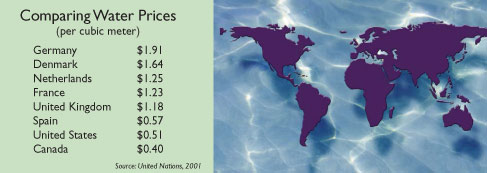|
|
What Price Water?downloadable pdf This issue of Explore underscores the University of Florida’s leadership role in research on water issues that are so vital to our state. Researchers in a wide range of disciplines contribute to our understanding of the complex systems represented by aquifers, lakes, rivers and estuaries.
One of those disciplines is economics. UF’s Public Utility Research Center, or PURC, has devoted more than 30 years to studying infrastructure policy in Florida and around the world. PURC contributes to the policy conversation through events like last spring’s statewide conference, “How Should Florida’s Water Supply be Managed in Response to Growth?” That event, co-sponsored by PURC and UF’s Askew Institute, brought together policymakers and opinion leaders from throughout the state to discuss water management. During that conference, several participants and I emphasized that water is not free, it has real costs. Economics insists that we understand what we are giving up when we make choices, whether it’s watering our lawns or filling our swimming pools. Like all scarce resources, use today takes away from availability tomorrow, and use by one sector diminishes availability to another. Of course, valuing the contribution of water is difficult. Wetlands and estuaries contribute to the health of the ecosystems, impacting biodiversity and sustainability. Rivers, lakes and springs provide all of us recreational opportunities. Economists in the UF College of Business and in the Institute of Food and Agricultural Sciences rely on data from colleagues in hydrology, demography, geography and other disciplines to develop models that provide frameworks for capturing complexity, understanding patterns and predicting outcomes.
Sophisticated modeling is essential if we are to establish solid, science-based policy. Science can tell us past trends, establish baselines and facilitate the analysis of alternative scenarios. Engineers look to technology for solutions to water scarcity problems. Hydrologists seek a greater understanding of the impacts of water usage and wetlands on water levels and flows within watersheds. Environmental scientists address ecosystem sustainability. Planners deal with land use, population growth projections and zoning issues. Political scientists focus on issues of power, legitimacy, social cohesion and the roles of different stakeholder groups. Legal scholars emphasize procedural fairness and how due process and transparency contribute to the legitimacy of outcomes. Despite the contributions from all of these disciplines, our models are still incomplete. It’s said that all models are wrong, but some models are useful. Water policy decisions are always made on the basis of incomplete information. We strive to develop models whose accuracy makes them useful to decision makers. Ultimately, our policy decisions will reflect our values regarding water stewardship.
Economists understand the importance of sending people price signals that provide them with incentives to conserve. From this perspective, water is a commodity with values in alternative uses, including future consumption and environmental restoration. Experiences in other countries can help us understand the impacts of different policies on water systems. Recent research at PURC has focused on evaluating the performance of water utilities in a number of countries, including the United Kingdom, Uganda, Brazil and Peru. These studies yield insights into how incentives can improve outcomes for future generations. In addition, PURC has provided training to regulatory policymakers and infrastructure executives from throughout the world. Since 1997, more than 1,400 utility regulators and managers from 126 countries have attended the PURC/World Bank International Training Program on Utility Regulation and Strategy, a two-week course PURC has delivered 18 times. In recognition of its important role in international training, PURC received the World Bank President’s Award for Excellence in December 2002 for “outstanding support and partnership.” The training programs are supplemented by in-country and regional PURC courses that have reached all of Latin America and the Caribbean, Australia, South Africa and countries in Europe and the Far East. Through this dialogue, we can learn from others about innovative approaches to the efficient management of water resources and the delivery of water services to meet diverse needs. Water problems are complex: they are managed, not solved. We have much to learn about how different approaches to water management affect sector performance. Many perspectives are necessary for developing and implementing sound public policy. UF recently formed a Water Institute to bring together its considerable expertise about water issues, improving our understanding of aquatic systems and contributing to more effective water quality and quantity policies. In the future, we anticipate even more interdisciplinary research through the institute. We Floridians have a responsibility to leave future generations with a legacy, not a disaster. The Florida Legislature took a significant step in that direction this spring when it passed comprehensive water-quality legislation that provides $100 million a year to the state Department of Environmental Protection to establish and track maximum daily loads of nitrates and other pollutants the state’s water bodies can handle. Much of the science behind establishing those loads has been and continues to be developed at UF. The university’s impact on water policy around the world illustrates the kind of contributions that can be made when multiple disciplines are brought together to address major policy issues like the management of water, a scarce natural resource critical to our lives. |



